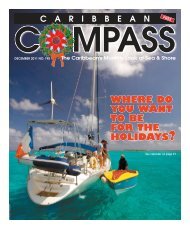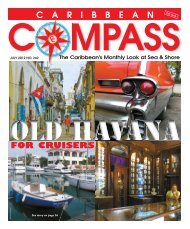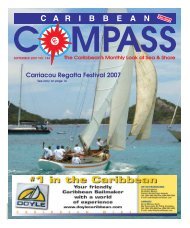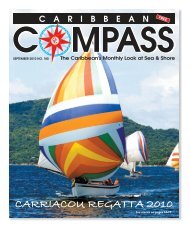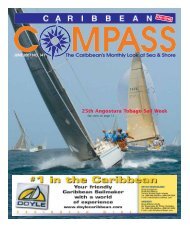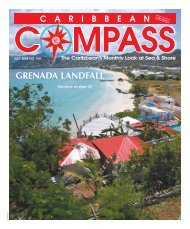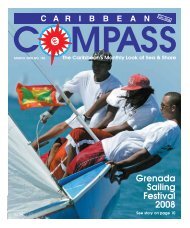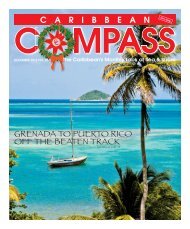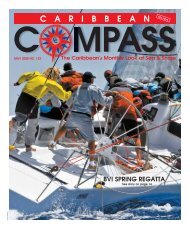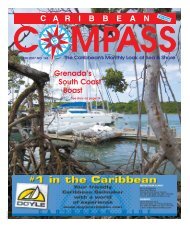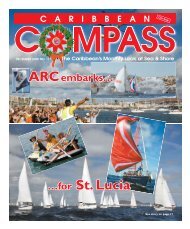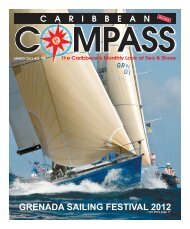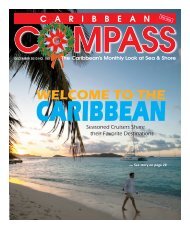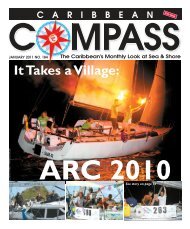You also want an ePaper? Increase the reach of your titles
YUMPU automatically turns print PDFs into web optimized ePapers that Google loves.
JANUARY 2008 CARIBBEAN COMPASS PAGE 44<br />
For Sale<br />
BACCHANAL TOO<br />
Cheoy Lee Offshore 50<br />
John Alden designed<br />
Fiberglass classic, long keel<br />
LOA: 50’ 6” / LWL: 34’ 2” / Beam: 13’ 8” / Draft: 6’ 5”<br />
Lying St. Vincent, US 99,000<br />
Tel (784) 458-4283 beachcombers@cariaccess.com<br />
rare + exotic arts + crafts<br />
tel: 440-2310<br />
interior design<br />
young street st. georges<br />
grenada<br />
e-mail: fisher@caribsurf.com<br />
Jewelry, Wooden-Ware & Hammocks<br />
—Continued from previous page<br />
Has he read the 2003 ECLAC (United Nations<br />
Economic Commission for Latin America and the<br />
<strong>Caribbean</strong>) report that states that yachts contributed<br />
some EC$36 million to the Grenadian economy and<br />
provided employment for 250 people? Doesn’t sound<br />
like freeloaders to me.<br />
Name Withheld by Request<br />
Dear <strong>Compass</strong>,<br />
I’m not, generally, one to write letters to the editor,<br />
but Peter de Savary’s comments in the interview, in<br />
the November <strong>Compass</strong>, discussing the Port Louis<br />
project in St. George’s Lagoon, Grenada, raised serious<br />
concerns in my mind.<br />
Mr. de Savary’s characterization of cruisers as “freeloaders”<br />
is personally insulting and very unsettling.<br />
Grenada has a long history as a haven for cruisers.<br />
In our two years in the <strong>Caribbean</strong>, we have spent over<br />
three months in Grenada. The people of Grenada have<br />
been gracious, friendly and helpful. We know many<br />
residents of Grenada, a significant portion of whom we<br />
know well enough to consider them our friends.<br />
During our time in Grenada, we have spent, by our<br />
standards, considerable sums of money enjoying the<br />
restaurants, taking advantage of the shops, provisioning,<br />
upgrading and repairing our boat. There is substantial<br />
infrastructure on the island to support cruisers<br />
and we have gladly and gratefully taken advantage<br />
of the available services and expertise. I’m sure, however,<br />
the folks we have done business with in Grenada<br />
do not consider us “freeloaders”.<br />
In the October <strong>Compass</strong>, there was a detailed article<br />
(“Grenada’s South Coast: Yacht Services on a Rising<br />
Tide”) which left the reader with the distinct impression<br />
Grenada intended to remain a preferred destination for<br />
cruisers. The Port Louis project and Mr. de Savary’s<br />
comments seem to be contrary to that intention.<br />
It is my sincere hope that Mr. de Savary’s belligerent<br />
attitude toward cruisers does not become institutionalized<br />
among the power structure of Grenada. It is my<br />
further hope that Grenada will continue to welcome all<br />
cruisers, in spite of Mr. de Savary.<br />
John Rowland<br />
S/V Silver Seas<br />
As new marinas are being built and existing ones<br />
expanded to provide more dockage for yachts, fans of<br />
free anchoring wonder, ‘Where do we go from here?’<br />
Dear Aubrey, Name Withheld and John,<br />
I hope I didn’t inadvertently give the impression that<br />
Peter de Savary thinks every single cruiser in the world<br />
is a freeloader, as I doubt that would be the case.<br />
Nobody who has seen the 2003 ECLAC yachting report<br />
(www.eclac.org/publicaciones/xml/7/14387/G0775.<br />
pdf) or who works in the industry can call the yachting<br />
community as a whole “freeloaders”.<br />
We all know cruisers who spend considerable sums<br />
in the <strong>Caribbean</strong> and elsewhere. But since the subject<br />
of freeloaders has come up, most of us have also witnessed<br />
the behavior of some who really are — sneaking<br />
into marinas at night to “liberate” water, posing as<br />
guests at all-inclusive resorts to chow down at the buffet,<br />
skipping out on boatyard bills, “borrowing” gear<br />
from other yachts, etcetera, etcetera. We don’t have<br />
time for these guys, either.<br />
Re: Aubrey’s statement “The Lagoon has been a free<br />
sheltered anchorage for sailors since the time of<br />
Columbus”. The Lagoon was not actually accessible to<br />
yachts until a channel was dredged in 1960 to accommodate<br />
them. It’s been a popular yacht anchorage for<br />
about 40 years. But the government giveth, and the<br />
government taketh away: now the Grenada government<br />
has apparently decided to change the Lagoon<br />
from a yacht anchorage to a yacht marina. Would cruisers<br />
be happier if it continued as a free anchorage? No<br />
doubt. Would the Grenadian people and economy be<br />
better off with the Lagoon as an anchorage, or as a<br />
marina? Time will tell.<br />
Aubrey also refers to squatters who were “evicted by<br />
this development”. Yes, people who had taken up residence<br />
on land that is now part of the Port Louis project<br />
were “evicted”, but they were not made homeless.<br />
With the help of the Grenada government, de Savary’s<br />
company acquired tracts of land at Beausejour and La<br />
Sagesse, new houses were built and, although not all<br />
were pleased by the move, the squatters were resettled.<br />
Moreover, we’ve been told that the former squatters<br />
were given legal title to their new homes and<br />
house lots.<br />
Re: land-based pollution of the Lagoon. As we mentioned<br />
in the article, assistance has been offered by de Savary to<br />
the Grenada government to help prevent sewage and<br />
other contaminated run-off from the surrounding land<br />
entering the Lagoon. We hope that the marina’s new owners,<br />
Camper & Nicholsons, will take up this initiative.<br />
Having said all that, the issue of creeping anchorage<br />
loss is a real and urgent one, and one we’ve addressed<br />
before. As yacht traffic increases in the region, anchoring<br />
is increasingly being prohibited for reasons ranging<br />
from environmental protection to avoidance of user conflicts<br />
to development of marinas and other commercial<br />
enterprises. Not just in Grenada, but across the<br />
<strong>Caribbean</strong>, there is the need for policies that balance<br />
these factors with the overwhelming desire of yachtspeople<br />
to have access to abundant anchorages. While<br />
the clock will never turn back to the days when we<br />
could anchor just about anywhere, we hope that the<br />
powers that be will wisely use the principle of “asset<br />
allocation”, designating appropriate areas for environmental<br />
reserves, fishing, commercial shipping and<br />
recreational boating — including an appropriate mix of<br />
marina slips, moorings and plenty of room for good oldfashioned<br />
anchoring.<br />
Sally<br />
Dear <strong>Compass</strong>,<br />
Am I alone in questioning the wisdom of the<br />
Mediterranean Yacht Brokers Association (MYBA)<br />
decision to involve themselves directly in commercial<br />
enterprises such as the St. Martin Charter Show?<br />
Unless MYBA radically change their perception of who<br />
they are and what they represent I see a potentially<br />
serious conflict of interest.<br />
These are two quotes taken directly from the<br />
MYBA website:<br />
WHAT IS MYBA<br />
Over the last decade in particular, yachting has evolved<br />
immeasurably and, as a result, MYBA has adopted an<br />
increasingly influential and significant role in an industry<br />
which has no regulatory body or ombudsman.<br />
OUR OBJECTIVES<br />
To provide a framework with a view to the resolution<br />
of commercial conflicts between Members or between<br />
Members and their contracted parties with a view to<br />
suggesting solutions with professional common practice<br />
and with current regulations through mediation.<br />
As far as I am aware, every respected regulatory body<br />
or ombudsman takes care to avoid any potential conflict<br />
of interest in the matters they are supposed to be advising<br />
on or regulating. FIMBRA (Financial Intermediaries,<br />
Managers and Brokers Regulatory Association) in the<br />
UK could hardly mediate with any impartiality the financial<br />
affairs or irregularities taking place in banks if they<br />
were the owners of HSBC bank for example. By taking<br />
on a direct and commercially recognized role in an<br />
industry event like the St. Martin Show, MYBA have<br />
divorced themselves from any notion that they could<br />
(now) ever be considered to be truly impartial.<br />
—Continued on next page



